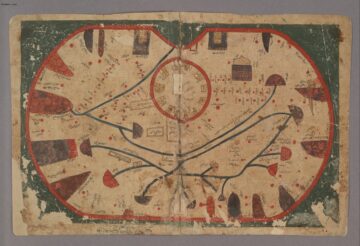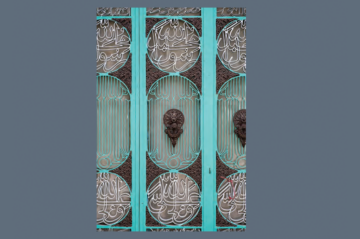As part of The Institute of Ismaili Studies’ Golden Jubilee publications, three new books were introduced at the Scarborough Ismaili Jamatkhana, Toronto, by Professor Azim Nanji and Dr. Fahmida Suleman, on 27 December 2007. This was followed by a similar launch at the Burnaby Ismaili Centre in Vancouver on 1 January 2008.
The first book, entitled Master of the Age: An Islamic Treatise on the Necessity of the Imamate, is a critical edition and translation by Professor Paul E. Walker, Research Associate, Department of Near Eastern Languages and Civilizations at the University of Chicago, of an original work by the 11th-century Ismaili thinker and da‘i, Hamid al-Din al-Kirmani. The Arabic treatise called al-Masabih fi ithbat al-imama (“Lights to Illuminate the Proof of the Imamate”) was composed in c.1015 CE to try to convince Fakhr al-Mulk, the Shi‘i wazir of the BuyidsSee Buwayhids in Baghdad, to abandon the AbbasidsMajor Muslim dynasty of Sunni caliphs that ruled in Baghdad (750-1258). and support the Fatimid Imam-caliph al-Hakim bi-amr Allah and the Fatimid cause. Few doctrines in Islam have engendered as much debate as those surrounding the Imamate. In the medieval period, while the Caliphate still existed, rivalry among the claimants was particularly intense. In this context, al-Kirmani produced a long, interconnected series of philosophical arguments logically constructing the absolute necessity of the Imamate. This work is unique in the precision of its doctrine and in the historical circumstance surrounding its composition. The book includes some 30 full-colour plates from manuscripts in the IIS library.
The second book was Arts of the City Victorious: Islamic Art and Architecture in Fatimid North Africa and Egypt by Professor Jonathan M. Bloom, Norma Jean Calderwood University Professor of Islamic and Asian Art at Boston College and Chair of Islamic Art at the Virginia Commonwealth University. Backed by over 30 years of research in the field, this is the first book-length study of the art and architecture of the FatimidsMajor Muslim dynasty of Ismaili caliphs in North Africa (from 909) and later in Egypt (973–1171) More, the Ismaili Shi‘i dynasty that ruled in North Africa and Egypt from 909 to 1171 CE. The Fatimids founded al-Qahira (Cairo) in 969 CE. The arts produced under their patronage and in their domains are admired for their lively figural imagery, elegant and inventive Arabic calligraphy, and their blend of eastern and western traditions. Professor Bloom’s book covers a wide spectrum of the arts, including architecture, textiles, ceramics, metalwork and carved rock crystal, ivory and woodwork. With over 100 photographs, extensive notes and bibliography, this book provides a fascinating window into the visual culture shared among the Muslim, Christian and Jewish inhabitants of the Fatimid domains for researchers and admirers of art and architecture alike.
The third title launched was Word of God, Art of Man: The Qur’an(also Koran. Arabic term meaning, ‘recitation’ or ‘scripture’): Muslims believe that the Holy Qur’an contains divine revelations to the Prophet Muhammed received in Mecca and Medina over a period of… More and its Creative Expressions. Selected Proceedings from the International Colloquium, London, 18-21 October 2003. This collection of essays is based on the proceedings of a conference held at the London Ismaili Centre in 2003 as part of the Institute’s 25th anniversary programmes. An exhibition entitled ‘Illuminating Beauty, Illustrating Harmony’was held at the same time. The 16 chapters in the book explore expressions of the Holy Qur’an in a range of media and include a contextual introduction by Dr. Fahmida Suleman who organised the conference and edited the papers for this volume. Contributors include museum curators and academics of art and architectural history, palaeography and material anthropology. Their studies span four continents and cover topics from medieval coins and early illuminated copies of the Holy Qur’an to contemporary paintings. Essays provide a multidisciplinary approach to the questions of how, why and in what contexts has the Holy Qur’an inspired Muslim artists and craftspeople to adorn with its verses the spaces they inhabit and the objects they cherish. The volume includes 120 colour illustrations, some published for the first time, an extensive bibliography and the opening address delivered by His Highness the Aga KhanA title granted by the Shah of Persia to the then Ismaili Imam in 1818 and inherited by each of his successors to the Imamate..
Attended by over a thousand people, both launches in Canada were followed by lively and engaging question-and-answer sessions and a book signing. Professor Nanji also announced three forthcoming Jubilee publications. Dr. Suleman discussed the work of the Institute in Qur’anic Studies and provided some background on a forthcoming multi-volume publication entitled An Anthology of Qur’anic Commentaries.






